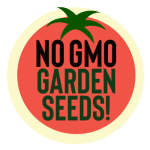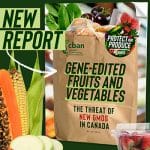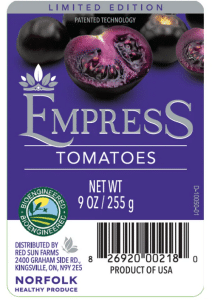Tomatoes
Market Status
 There are no genetically engineered (genetically modified or GM) tomatoes on the market in Canada but a genetically engineered Purple Tomato™ has been approved for sale in Canada (August 2025) and could appear in grocery stores at any time. GM purple tomato seeds in small packets can also now be purchased online by growers in Canada. January 5, 2026: GM Product Alert: Genetically Engineered Purple Tomato Seeds & Fruit Approved in Canada
There are no genetically engineered (genetically modified or GM) tomatoes on the market in Canada but a genetically engineered Purple Tomato™ has been approved for sale in Canada (August 2025) and could appear in grocery stores at any time. GM purple tomato seeds in small packets can also now be purchased online by growers in Canada. January 5, 2026: GM Product Alert: Genetically Engineered Purple Tomato Seeds & Fruit Approved in Canada
The slow-ripening GM Flavr Savr™ was approved for eating in Canada in 1995 but taken off the market by Monsanto in 1997.
On this page
Updates
 Health Canada and the Canadian Food Inspection Agency have approved the genetically engineered Purple Tomato™ (Del/Ros1-N) from Norfolk Health Produce for “Increased anthocyanins in the fruit.” The seeds are being sold to home gardeners in Canada via the company’s website. Unlike many future gene-edited GMOs that are exempt from pre-market regulation, this GM tomato was assessed for food safety by Health Canada and it was assessed for environmental safety by the Canadian Food Inspection Agency (as of December 4, 2025, the CFIA decision document is not posted).
Health Canada and the Canadian Food Inspection Agency have approved the genetically engineered Purple Tomato™ (Del/Ros1-N) from Norfolk Health Produce for “Increased anthocyanins in the fruit.” The seeds are being sold to home gardeners in Canada via the company’s website. Unlike many future gene-edited GMOs that are exempt from pre-market regulation, this GM tomato was assessed for food safety by Health Canada and it was assessed for environmental safety by the Canadian Food Inspection Agency (as of December 4, 2025, the CFIA decision document is not posted).
- CBAN Press Release – December 16, 2025: Farmers warn home gardeners about genetically engineered vegetable seeds coming soon
- CBAN Briefing – December 15, 2025- Updated Jan 5, 2026: GM Product Alert: Genetically Engineered Purple Tomato Seeds & Fruit Approved in Canada
- CBAN Report – Updated December 2, 2025: Gene-Edited Fruits and Vegetables: The Threat of New GMOs in Canada
- CBAN Briefing – November 2025: Alert: Genetically Modified Garden Seeds
October 2025 – GM Tomato Efficacy Test: A 21-day study on humans will be conducted to investigate if a gene-edited tomato (from the John Innes Centre, UK) can increase Vitamin D levels in humans. This is not a food safety study. Read more from GMWatch.
The Purple Tomato™
December 15, 2025- Updated January 5, 2026: GM Product Alert: Genetically Engineered Purple Tomato Seeds & Fruit Approved in Canada
“We’re exploring it now and will likely be active next year on the Canadian front. What’s really important for us is to show in a market or test in a market, is this something that a lot of consumers really want?” – Nathan Pumplin, CEO, Norfolk Plant Sciences, US, 2023.
 The Purple Tomato™ is approved for growing and eating in Canada (August 2025). It is already sold in a small number of US grocery stores as the “Empress Limited Edition Tomato”, grown and disributed by Red Sun Farms, headquartered in Kingsville, Ontario. It is sold as seeds for home gardeners and small growers in the US and Canada on Norfolk Healthy Produce’s website and has been sold as seedlings and fruit at a few farmers’ markets in the US.
The Purple Tomato™ is approved for growing and eating in Canada (August 2025). It is already sold in a small number of US grocery stores as the “Empress Limited Edition Tomato”, grown and disributed by Red Sun Farms, headquartered in Kingsville, Ontario. It is sold as seeds for home gardeners and small growers in the US and Canada on Norfolk Healthy Produce’s website and has been sold as seedlings and fruit at a few farmers’ markets in the US.
Health claims: The company Norfolk Healthy Produce says the Purple Tomato™ was engineered for “health and nutrition.” It was genetically engineered with two genes from snapdragon flowers, to increase the plant’s anthocyanin production which is also makes the tomato purple. Anthocyanins are a type of flavonoid that has antioxidant properties. Read GM Purple Tomato to “keep cancer at bay”, GMO Promises, 2025.
Unnecessary GM tomato: There are already many non-GM purple tomato varieties on the market, that have been bred using traditional breeding methods to contain higher levels of anthocyanins. Click here for details and a list of non-GM purple tomatoes.
Patent enforcement: Norfolk Healthy Produce enforces patent protection over their GM seeds but tells gardeners that they may save and share the patented seeds as long as they do not sell them: “Growers can save the seeds and enjoy the plants and fruits in your home garden and with your local community.” Saving and sharing the seeds means that GM contamination will occur. There has already been confusion and controversy over this product when, in 2024, a well-known, non-GM heirloom seed company in the US sourced and advertised a purple tomato variety that may have been the GM tomato or was contaminated by it. Read more:
- GM purple tomato company targets non-GMO seed company over alleged patent infringement. GMWatch. March 12, 2024.
- Rotten tomato: Biotech company makes false claim about its GMO purple tomato. Ken Roseboro, The Organic and Non-GMO Report. April 9, 2024.
The Flavr Savr™ Tomato
1995-1997
The first GM food approved in Canada (and the US) was the “Flavr Savr” tomato from the company Calgene, which was later bought by Monsanto. It was genetically modified to soften at a slower rate, so that the tomato could stay ripening on the vine longer, before being picked for transport “resulting in more flavour.” (Tomatoes are generally picked unripe so they can survive transport to grocery stores and have a longer shelf-life).
The “Flavr Savr” was launched in the US in 1994 and approved in Canada in 1995, but was taken off the market by Monsanto in 1997.
Despite the disappearance of the “Flavr Savr,” the industry was still using it as an example to advertise the consumer benefits of genetic engineering three years later: An information kit circulated in 2000 in Canada, from the industry public relations group called the Council for Biotechnology Information (funded by Monsanto and other biotech nology companies) said, “Biotechnology is producing food that tastes better and stays fresh longer. Our new type of tomato ripens slowly, keeping it fresh for longer periods of time.”
Dr. Belinda Martineau, the former genetic engineer who developed the Calgene GM tomato, describes that they inadvertently inserted bacterial DNA into the Flavr Savr tomatoes and discovered the error before commercialization.
- Read about it in her article We need the whole truth to regulate GMOs, Biotech Salon, July 15, 2023.
- Read more in her book: Martineau, Belinda. First Fruit: The creation of the Flavr Savr™ tomato and the birth of biotech food. McGraw-Hill, 2001.





